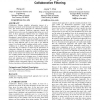Free Online Productivity Tools
i2Speak
i2Symbol
i2OCR
iTex2Img
iWeb2Print
iWeb2Shot
i2Type
iPdf2Split
iPdf2Merge
i2Bopomofo
i2Arabic
i2Style
i2Image
i2PDF
iLatex2Rtf
Sci2ools
116
click to vote
SIGIR
2004
ACM
2004
ACM
An automatic weighting scheme for collaborative filtering
Collaborative filtering identifies information interest of a particular user based on the information provided by other similar users. The memory-based approaches for collaborative filtering (e.g., Pearson correlation coefficient approach) identify the similarity between two users by comparing their ratings on a set of items. In these approaches, different items are weighted either equally or by some predefined functions. The impact of rating discrepancies among different users has not been taken into consideration. For example, an item that is highly favored by most users should have a smaller impact on the user-similarity than an item for which different types of users tend to give different ratings. Even though simple weighting methods such as variance weighting try to address this problem, empirical studies have shown that they are ineffective in improving the performance of collaborative filtering. In this paper, we present an optimization algorithm to automatically compute the w...
Related Content
| Added | 30 Jun 2010 |
| Updated | 30 Jun 2010 |
| Type | Conference |
| Year | 2004 |
| Where | SIGIR |
| Authors | Rong Jin, Joyce Y. Chai, Luo Si |
Comments (0)

